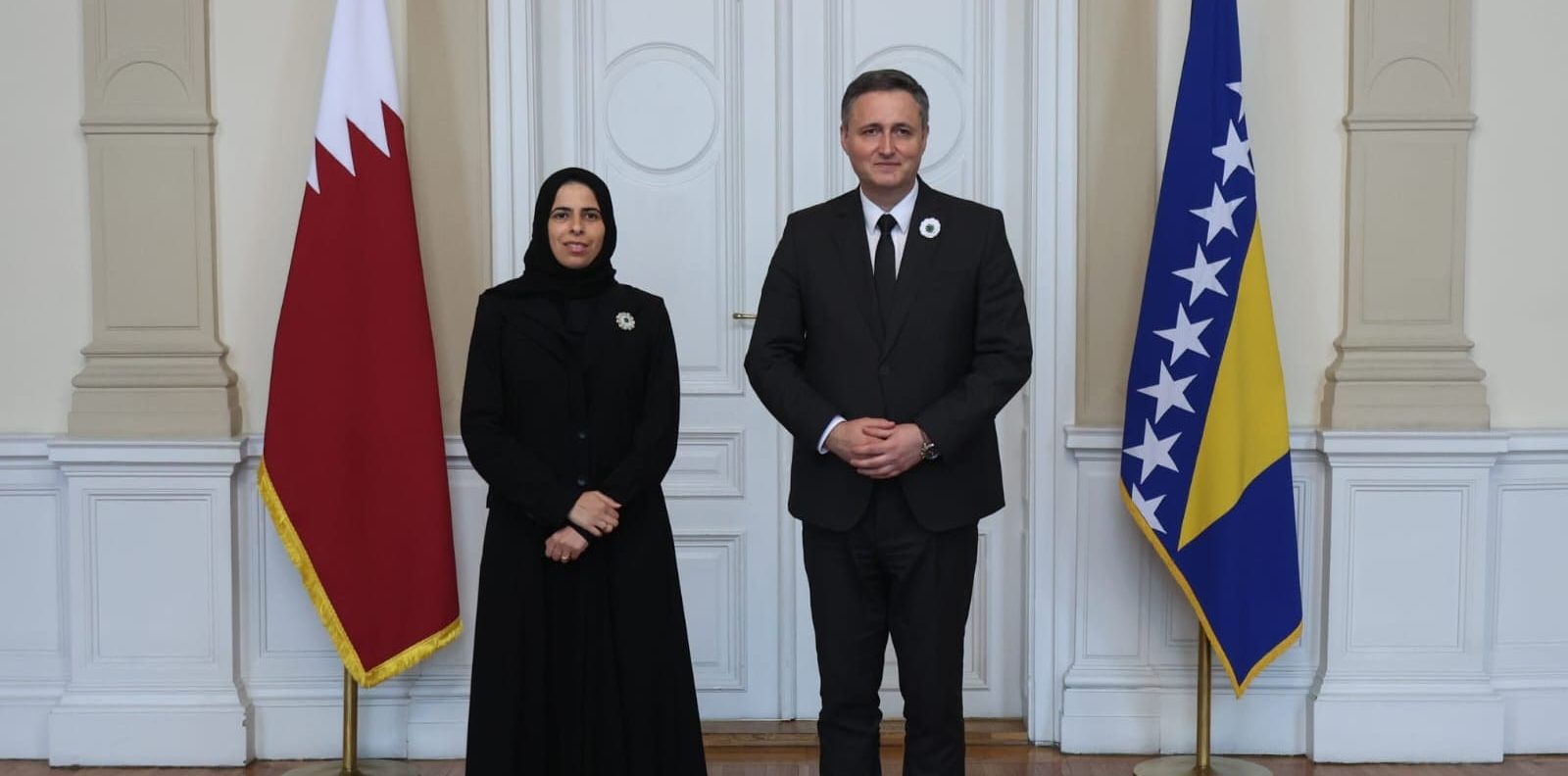The Qatari official is also due to speak in Sarajevo on Wednesday at a session titled “From the Balkans to Gaza: A Critical Examination of Genocide” which is taking place ahead of the anniversary of the 1995 Srebrenica genocide.
The Chairman of the Presidency of Bosnia and Herzegovina, Denis Becirovic, praised Qatar’s mediation efforts in the Gaza Strip during a meeting with the Gulf state’s Minister of State for International Cooperation, Lolwah Al Khater.
According to Qatar’s foreign ministry, the meeting took place in Sarajevo on Tuesday, where both sides discussed bilateral cooperation and the developments in the Gaza Strip.
“Chairman of the Presidency of Bosnia and Herzegovina expressed his country’s appreciation for the role of the State of Qatar and its efforts to achieve a ceasefire in Gaza, and stressed its keenness to strengthen joint bilateral cooperation, especially in the fields of economy, tourism and culture,” the Qatari foreign ministry said in a statement.
A separate meeting took place on the same day between the Qatari official and Minister of Human Rights and Refugees of Bosnia and Herzegovina, Sevlid Hortic.
The discussions also centred on cooperation relations between the two countries particularly in the field of human rights as well as the development in the Gaza Strip.
Hortic also gave Al Khater the flower of Srebrenica medal, a symbol of solidarity with victims of the Srebrenica genocide victims.
The vocal Qatari diplomat has been at the forefront of evacuation and humanitarian efforts in Gaza since the beginning of Israel’s, widely referred to as, genocidal war. Last November, she became the first high-ranking Arab official to enter Gaza when she visited Rafah.
Al Khater has been personally welcoming all Palestinians evacuated from the Gaza Strip, including holders of Qatari residency and those receiving treatment under the initiative by Qatar’s Amir Sheikh Tamim bin Hamad Al-Thani.
The Qatari official is also due to speak in Sarajevo on Wednesday at a session titled “From the Balkans to Gaza: A Critical Examination of Genocide” which is taking place ahead of the anniversary of the 1995 Srebrenica genocide.
The session is organised by The Islam and Muslims Initiative (IMI) in collaboration with the Sarajevo Center for Advanced Studies. Speakers on the panel include Palestinian photojournalist Motaz Azaiza, Sarajevo Mayor Benjamina Karic, and Slovenia’s President Natasa Pirc Musar among others.
“The session will explore the profound impacts of Islamophobia, tracing its historical roots and contemporary manifestations. We will delve into the parallels between the Srebrenica genocide, the Sarajevo siege, the unfolding genocide in Gaza, and colonial expansion in Palestine,” the IMI said.
On July 11, 1995, Bosnian Serb forces captured Srebrenica, a UN-protected area, which killed around 8,000 Muslim men and teenagers.
The genocide was known as the worst in Europe since World War II.
In late May, the UN passed a resolution to designate July 11 as the “International Day of Reflection and Commemoration of the 1995 Genocide in Srebrenica.”
The Gaza Strip is currently witnessing one of the worst wars in modern history, widely described as a genocide. Since October 7, Israel has killed at least 38,243 Palestinians, mainly women and children, while injuring 88,243 others.
According to the UN, the war has destroyed more than 80 percent of the Strip’s commercial facilities and more than 60 percent of residential buildings while displacing 1.9 million out of the 2.1 million population.
A report by The Lancet on Friday found that the total death toll in the Gaza Strip, including indirect deaths, could reach 186,000, representing 8 percent of the besieged enclave’s population.
“Even if the conflict ends immediately, there will continue to be many indirect deaths in the coming months and years from causes such as reproductive, communicable, and non-communicable diseases,” the report said.
The war has been widely described as a continuation of the Nakba, or Catastrophe, in which Israel forcibly displaced and killed Palestinians to establish a Jewish state in 1948.







